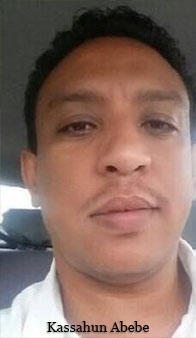
Thank you for reading D.C. Witness. Help us continue our mission into 2024.
Donate NowBy
D.C. Witness Staff
- May 15, 2018
Court
|
Homicides
|
Suspects
|
Did the defendant of a deadly assault intentionally mean to kill a father of two?
Milkiyas Bayisa is being charged with second-degree murder for allegedly fatally punching Kassaahun Abebe Edo outside of the Peace Lounge on the 700 block of Fairmont Street, NW on Aug. 22, 2015. Edo, 35, was placed on life support and diagnosed as critical when he arrived at Medstar Washington Hospital Center later that night. He was officially pronounced dead on Aug. 23, 2015.
According to the prosecution, on the night of the assault, Bayisa, 27, was “angry, hot, mad, aggressive and enraged” to the point that he viciously attacked Edo, causing him to “prematurely” die. Edo suffered from a closed head injury, a neurosurgery expert told the jury. Doctors concluded that Edo’s condition would only get worse and was medically futile.
“We got here because the defendant could not control his anger [and] aggression in [an] ability to control whatever was going on that night,” the prosecution said during its closing statement. “This was a one, two knockout punch.”
However, the prosecution’s statement didn’t only reflect Bayisa’s mood at the time of the assault, it also touched on the fact that Edo, a Texan resident who was in town for a friend’s wedding, lost his life. The prosecution said the case wasn’t about Bayisa at all, it was about Edo.
The defense attacked the prosecution during its closing statement, saying counsel was wrong and incorrect for telling jurors the case was not about Bayisa. “This case is only about Mickey Bayisa,” defense attorney Steven Kiersh said. Kiersh requested the jury not make their ruling based on emotion, but the facts.
There was no intent of harm on Bayisa’s part, Kiersh said. In fact Kiersh said Bayisa tried to calm things down.
“He could have walked away, if, in fact, he was this peaceful man,” the prosecution rebutted.
According to a nuerosurgery expert, Edo was more than likely concussed or dazed as he hit the ground.
The prosecution said, Edo’s dazed or concussed stated of mind prevented him from breaking his fall. But, the defense tried to blame Edo’s lack of breaking his fall to his high blood alcohol level — .127 percent. The legal level to operate a motor vehicle in D.C. is .08 percent.
Jurors began deliberations on May 14. However, just after the jury proceeded to deliberate Bayisa’s lawyer asked Superior Court Judge Judith Bartnoff for one last acquittal.
Kiersh said the case should be acquitted because the prosecution, during its closing argument, used the words “thank God,” when referring to a witness, who was a server at the lounge, identifying Bayisa.
Kiersh cited a D.C. Court of Appeals ruling that prohibited the court from injecting God into judicial matters. Judge Bartnoff denied the acquittal because she did not think the prosecution was necessarily inserting God into the argument, but rather exclaiming a sigh of relief.
Follow this case